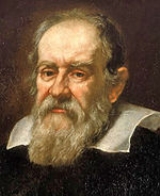What did he do to become famous?
replied to: amber15
Replied to: What did he do to become famous?
Though he did not invent the telescope, he was the first to grasp its potential in astronomy. He made two important discoveries with it, which laid his claim for fame.
(1) on the night of January 7th 1610, he discovered the four largest moons of Jupiter which were revolving around it, and this was the observational proof needed to support Copernicus' heliocentric Solar System. (Copernicus had published this view in 1543 in a book entitled "On the revolutions of the heavenly spheres")
Plainly if these moons went around Jupiter, everything did NOT go around the Earth as was claimed under the geocentric model advanced by Ptolemy in the 2nd Century AD
(2) In September 1610 he trained his telescope on Venus and discovered that it exhibited a full range of phases jusr like The Moon, This was a further demonstration that everything went around the Sun, not the Earth.
Galileo was however confused by Saturn as he sometimes saw the rings head on and sometimes not, and thought he was seeing something akin to moons there as separate points of light, The first Saturnian moon, Titan, would not be discovered until 1655 by the Dutch astronomer Christian Huygens, by when the standard of telescopes had improved,
And in 1612 he recorded in his workbook that he saw what we now know to be Neptune, 234 years before it was discovered, but he didn't know what it was, and a further opportunity to make his name passed him by.
But Galileo was also active in other fields of physics and building a solid reputation in those, too. Wikipedia's biographical article starts off:
"Galileo Galilei (15 February 1564 – 8 January 1642) was an Italian physicist, mathematician, astronomer, and philosopher who is closely associated with the scientific revolution.
His achievements include the first systematic studies of uniformly accelerated motion, improvements to the telescope, a variety of astronomical observations, and support for Copernicanism.
Galileo's experiment-based work is a significant break from the abstract approach of Aristotle. Galileo is often referred to as the "father of modern astronomy," as the "father of modern physics", and as the "father of science".
The motion of uniformly accelerated objects, treated in nearly all high school and introductory college physics courses, was studied by Galileo as the subject of kinematics."
His problems with the Catholic Church and the Roman Inquisition's view of his theories led to his being placed under house arrest for the last dozen years of his life, after he had agreed to recant those views as heresies. But doing so enabled him to carrying writing and he smuggled pages of his books out via friends who got them published elsewhere.
For a good introduction to the man and how the Church handled his case, Brecht's play Galileo is well worth reading.
replied to: abcdefghijklmnop
Replied to: Though he did not invent the telescope, he was the first...
I think that is true but there has to be more than just that i mean he was famous !!! so i know theres more

